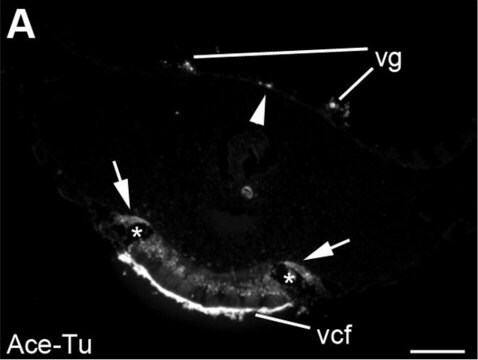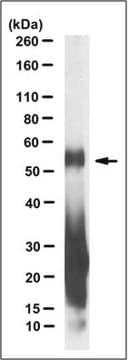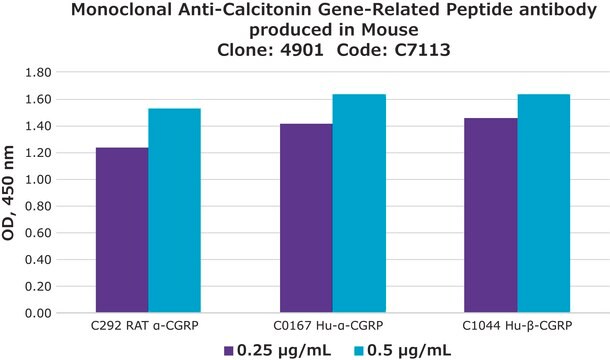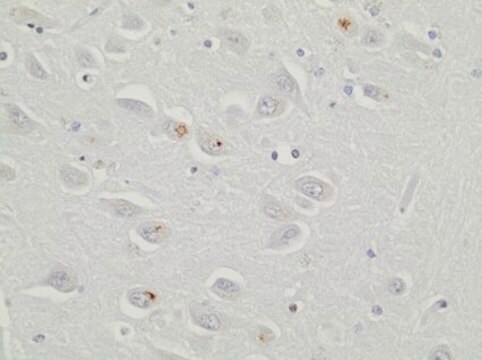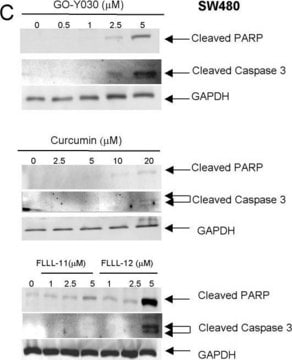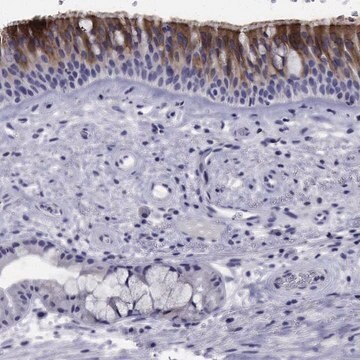추천 제품
일반 설명
Expansion of a GGGGCC (G4C2) hexanucleotide repeat sequence in the non-coding region of human chromosome 9 open reading frame 72 or C9orf72 (also known as ALSFTD, FTDALS; Gene ID 203228) is the most common genetic abnormality in familial and sporadic frontotemporal dementia (FTD) and motor neuron disease (MND), with amyotrophic lateral sclerosis (ALS) as the most frequent form. The number of hexanucleotide repeats in the normal population ranges from 2 to 24, whereas up to several thousand repeats (700 - 4,400 repeats) are found in the pathologically expanded allele. Unconventional repeat-associated non-ATG-initiated translation (RANT) of the GGGGCC repeats in the three alternate reading frames from both sense and antisense transcripts generates five types of dipeptide repeat (DPR) protein species, each composed of repeating units of two amino acids, glycine-alanine (GA), glycine-proline (GP), glycine-arginine (GR), alanine-proline (AP), proline-arginine (PR), respectively. The sense transcript (5′-GGGGCC-3′ hexanucleotide repeats) is translated through repeat-associated non-ATG (RAN) translation such that poly- (Gly- Ala), poly-(Gly-Pro), and poly-(Gly-Arg) proteins were produced. The anti-sense transcript (containing 5′-GGCCCC-3′ (G2C4) hexanucleotide repeats is translated through repeat-associated non-ATG (RAN) translation producing poly-(Pro-Ala), poly- (Pro- Arg), poly- (Gly- Pro) proteins. RAN proteins with the GP repeat motif are predicted in both the sense and antisense directions (GPsense and GPantisense)The antisense proteins accumulate in cytoplasmic aggregates in affected brain regions, including the frontal and motor cortex, hippocampus, and spinal cord neurons.
특이성
This polyclonal antibody recognizes C9ORF72/C9RANT (poly-GR).
면역원
Ac-RGRGRGRGRGRGRGRGRC-amide.
Epitope: unknown
애플리케이션
Anti-C9ORF72/C9RANT (Poly-GR), Cat. No. ABN1361, is a highly specific rabbit polyclonal antibody that targets C9ORF72 ( -GR sense) and has been tested in Immunofluorescence, Immunohistochemistry, Immunocytochemistry, and Western Blotting.
Research Category
Neuroscience
Neuroscience
Western Blotting Analysis: A representative lot detected C9ORF72/C9RANT (Poly-GR) in Western Blotting applications (Zu, T., et. al. (2013). Proc Natl Acad Sci USA. 110(51):E4968-77).
Immunohistochemistry Analysis: A representative lot detected C9ORF72/C9RANT (Poly-GR) in aggregates found in neurons of the CA and DG regions of the hippocampus (Zu, T., et. al. (2013). Proc Natl Acad Sci USA. 110(51):E4968-77).
Immunofluorescence Analysis: A representative lot detected C9ORF72/C9RANT (Poly-GR) in V5-GR-Ct Transfected HEK293T (Zu, T., et. al. (2013). Proc Natl Acad Sci USA. 110(51):E4968-77).
Immunocytochemistry Analysis: A 1:500 dilution from a representative lot detected C9ORF72/C9RANT (Poly-GR) in V5-GR-Ct transfected HEK293. (Courtesy of Dr Laura P.W. Ranum and Dr. Lien Nguyen from the University of Florida).
Immunohistochemistry Analysis: A representative lot detected C9ORF72/C9RANT (Poly-GR) in aggregates found in neurons of the CA and DG regions of the hippocampus (Zu, T., et. al. (2013). Proc Natl Acad Sci USA. 110(51):E4968-77).
Immunofluorescence Analysis: A representative lot detected C9ORF72/C9RANT (Poly-GR) in V5-GR-Ct Transfected HEK293T (Zu, T., et. al. (2013). Proc Natl Acad Sci USA. 110(51):E4968-77).
Immunocytochemistry Analysis: A 1:500 dilution from a representative lot detected C9ORF72/C9RANT (Poly-GR) in V5-GR-Ct transfected HEK293. (Courtesy of Dr Laura P.W. Ranum and Dr. Lien Nguyen from the University of Florida).
품질
Evaluated by Western Blotting in transfected HEK293 cell lysate.
Western Blotting Analysis: A 1:1,000 dilution of this antibody detected C9ORF72/C9RANT (Poly-GR) in 10 µL of lysate from HEK293 cells transfected with Flag-GR construct.
Western Blotting Analysis: A 1:1,000 dilution of this antibody detected C9ORF72/C9RANT (Poly-GR) in 10 µL of lysate from HEK293 cells transfected with Flag-GR construct.
표적 설명
~17.5 kDa observed. Uncharacterized bands may be observed in some lysate(s).
물리적 형태
Rabbit polyclonal antiserum with 0.05% sodium azide.
Unpurified
저장 및 안정성
Stable for 1 year at -20°C from date of receipt.
Handling Recommendations: Upon receipt and prior to removing the cap, centrifuge the vial and gently mix the solution. Aliquot into microcentrifuge tubes and store at -20°C. Avoid repeated freeze/thaw cycles, which may damage IgG and affect product performance.
Handling Recommendations: Upon receipt and prior to removing the cap, centrifuge the vial and gently mix the solution. Aliquot into microcentrifuge tubes and store at -20°C. Avoid repeated freeze/thaw cycles, which may damage IgG and affect product performance.
기타 정보
Concentration: Please refer to lot specific datasheet.
면책조항
Unless otherwise stated in our catalog or other company documentation accompanying the product(s), our products are intended for research use only and are not to be used for any other purpose, which includes but is not limited to, unauthorized commercial uses, in vitro diagnostic uses, ex vivo or in vivo therapeutic uses or any type of consumption or application to humans or animals.
적합한 제품을 찾을 수 없으신가요?
당사의 제품 선택기 도구.을(를) 시도해 보세요.
Storage Class Code
12 - Non Combustible Liquids
WGK
WGK 1
시험 성적서(COA)
제품의 로트/배치 번호를 입력하여 시험 성적서(COA)을 검색하십시오. 로트 및 배치 번호는 제품 라벨에 있는 ‘로트’ 또는 ‘배치’라는 용어 뒤에서 찾을 수 있습니다.
Hannah L Phillips et al.
Neuron, 111(6), 797-806 (2023-01-14)
Empathic function is essential for the well-being of social species. Empathy loss is associated with various brain disorders and represents arguably the most distressing feature of frontotemporal dementia (FTD), a leading form of presenile dementia. The neural mechanisms are unknown.
Maya Maor-Nof et al.
Cell, 184(3), 689-708 (2021-01-23)
The most common genetic cause of amyotrophic lateral sclerosis (ALS) and frontotemporal dementia (FTD) is a GGGGCC repeat expansion in the C9orf72 gene. We developed a platform to interrogate the chromatin accessibility landscape and transcriptional program within neurons during degeneration.
Shuangxi Li et al.
Cell reports, 32(5), 107989-107989 (2020-08-07)
Amyotrophic lateral sclerosis (ALS) manifests pathological changes in motor neurons and various other cell types. Compared to motor neurons, the contribution of the other cell types to the ALS phenotypes is understudied. G4C2 repeat expansion in C9ORF72 is the most
자사의 과학자팀은 생명 과학, 재료 과학, 화학 합성, 크로마토그래피, 분석 및 기타 많은 영역을 포함한 모든 과학 분야에 경험이 있습니다..
고객지원팀으로 연락바랍니다.
